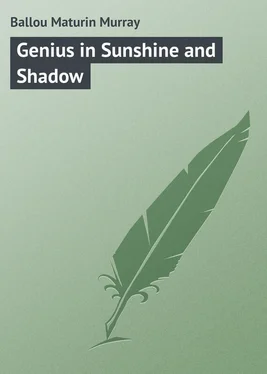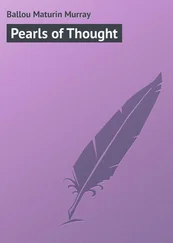Maturin Ballou - Genius in Sunshine and Shadow
Здесь есть возможность читать онлайн «Maturin Ballou - Genius in Sunshine and Shadow» — ознакомительный отрывок электронной книги совершенно бесплатно, а после прочтения отрывка купить полную версию. В некоторых случаях можно слушать аудио, скачать через торрент в формате fb2 и присутствует краткое содержание. Жанр: foreign_prose, foreign_humor, Анекдоты, на английском языке. Описание произведения, (предисловие) а так же отзывы посетителей доступны на портале библиотеки ЛибКат.
- Название:Genius in Sunshine and Shadow
- Автор:
- Жанр:
- Год:неизвестен
- ISBN:нет данных
- Рейтинг книги:4 / 5. Голосов: 1
-
Избранное:Добавить в избранное
- Отзывы:
-
Ваша оценка:
- 80
- 1
- 2
- 3
- 4
- 5
Genius in Sunshine and Shadow: краткое содержание, описание и аннотация
Предлагаем к чтению аннотацию, описание, краткое содержание или предисловие (зависит от того, что написал сам автор книги «Genius in Sunshine and Shadow»). Если вы не нашли необходимую информацию о книге — напишите в комментариях, мы постараемся отыскать её.
Genius in Sunshine and Shadow — читать онлайн ознакомительный отрывок
Ниже представлен текст книги, разбитый по страницам. Система сохранения места последней прочитанной страницы, позволяет с удобством читать онлайн бесплатно книгу «Genius in Sunshine and Shadow», без необходимости каждый раз заново искать на чём Вы остановились. Поставьте закладку, и сможете в любой момент перейти на страницу, на которой закончили чтение.
Интервал:
Закладка:
When the writer of these pages visited the grand temples of Nikko, in the interior of Japan, he was told that the wonderfully preserved carvings beneath the eaves and on the inner walls, thousands of years old, were executed by one who was known as the "Left-Handed Artist," who was a dwarf, and had but partial use of the right hand. It seems, according to the local legend preserved for so many centuries, that while this artist was working at the ornamentation of the temples at Nikko he saw and fell in love with a beautiful Japanese girl resident in the city; for Nikko was then a city of half a million, though now but a straggling village. The girl would have nothing to do with the artist, on account of his deformity of person. All his attempts to win her affection were vain; she was inflexible. Finally the heart-broken artist returned to Tokio, his native place. Here be carved in wood a life-size figure of his beloved, so perfect and beautiful that the gods endowed it with life, and the sculptor lived with it as his wife, in the enjoyment of mutual love, all the rest of his days. Here, then, in Japan, we have the legend upon which the Greek story of Pygmalion and Galatea is undoubtedly founded.
As regards the subject of plagiarism in general, which is so often spoken of as connected with literary productions, it should be remembered, as Ruskin says, that all men who have sense and feeling are being constantly helped. They are taught by every person whom they meet, and enriched by everything that falls in their way. The greatest is he who has been oftenest aided. 64 64 "Every one of my writings," says Goethe, "has been furnished to me by a thousand different persons, by a thousand different things. The learned and the ignorant, the wise and the foolish, infancy and age, have come in turn, generally without having been the least suspicious of it, to bring me the offering of their thoughts, their faculties, their experience; often have they sown the harvest I have reaped. My work is that of an aggregation of human beings taken from the whole of nature; it bears the name of Goethe."
"Literature is full of coincidences," says Holmes, "which some love to believe plagiarisms. There are thoughts always abroad in the air, which it takes more wit to avoid than to hit upon."
It has been truthfully said that no man is quite sane; each one has a vein of folly in his composition, a view which would certainly seem to be illustrated by circumstances which are easily recalled. Take, for instance, the fact that Schiller 65 65 When only eighteen years of age, in 1777, he wrote "The Robbers," a tragedy of extraordinary power, though he characterized it at a later day as "a monster for which fortunately there was no original." During a few years after its first publication it was translated into various languages and read all over Europe.
could not write unless surrounded by the scent of decayed apples, with which he kept one drawer of his writing-desk well filled. Could we have a clearer instance of monomania? He also required his cup of strong coffee when he was composing, and the coffee was well "laced" with brandy. Bulwer-Lytton, in his life of Schiller, declares that when he wrote at night he drank hock wine. As an opposite and much more agreeable habit, we have that of Méhul, the French composer, and author of over forty successful operas, who could not produce a note of original music except amid the perfume of roses. His table, writing-desk, and piano were constantly covered with them; in this delicious atmosphere he produced his "Joseph in Egypt," which alone would have entitled him to undying fame.
Father Sarpi, who was Macaulay's favorite historian, best known as the author of the "History of the Council of Trent," having the idea that the atmosphere immediately about him became in a degree impregnated with the mental electricity of his brain, was accustomed to build a paper enclosure about his head and person while he was writing. "All air is predatory," he said. Salieri, the Venetian composer, prepared himself for writing by filling a capacious dish at his side with candy and bonbons, which he consumed in large quantities during the process. Sarti, the well-known composer of sacred music, was obliged to work in the dark, or thought that he was, as daylight or artificial light of any sort at such moments utterly disconcerted him. Rossini, on the contrary, seemed to have no special ideas about his surroundings when he was in a mood for composing. He sat down among his friends, laughing and talking all the while that he was creating, and framing with marvellous rapidity strains that will live for all time. The whole of "Tancredi," which first made his fame, was produced in the very midst of social life and merry companionship. He said he found inspiration in the cheerful human voices about him. As to the peculiarities we have noted in others, they must at first have been mere affectations; but such is the force of habit, that no doubt these individuals became confirmed in them and really believed their indulgence a necessity.
Carneades, the Greek philosopher, so famed for his subtle and powerful eloquence, before sitting down to write dosed himself with hellebore, – a strange resort, as it is supposed to act directly upon the liver, and only very slightly to stimulate the brain, besides being a fatal poison in large doses. It is well known that Dryden resorted to singular aids as preparatory to literary composition; being in the habit of first having himself bled and then making a meal of raw meat. The former process, he contended, rendered his brain clear, and the latter stimulated his imagination. In 1668 he held the position now filled by Tennyson, as poet-laureate of England. He was a notable instance of power in poetry, satire, and indecency, whom Cowper characterized as a lewd writer but a chaste companion. Dryden's own couplet will forcibly apply to himself: —
"O gracious God! how far have we
Profaned thy heavenly gift of poesy!"
His "Essay on Dramatic Poesy," according to Dr. Johnson, entitled him to be considered the father of English criticism. His dramas, such as "Mariage à-la-Mode," "All for Love," "Don Sebastian," etc., were, by reason of their indecency, examples of perverted genius. He was sixty-six years old when he wrote his "Alexander's Feast," by far his best literary effort. While Macaulay calls him "an illustrious renegade," 66 66 Such facts as the following lead us to draw rather disparaging conclusions as to Dryden's character. He was short of money at a certain time, and sent to Jacob Tonson, his publisher, asking him to advance him some, which Tonson declined to do; whereupon Dryden sent him these lines, adding, "Tell the dog that he who wrote these can write more": —
Dr. Johnson says, "he found the English language brick and left it marble," – a most superlative and ridiculous comment to be made by so erudite a critic.
When James Francis Stephens, the English entomologist, was about to write, he mounted a horse and arranged his thoughts and sentences while at full gallop. This was a plan that Sir Walter Scott also adopted when he wrote "Marmion," galloping up and down the shore of the Firth of Forth. But he concluded that he could do better pen-work in a more rational manner, so this practice did not become habitual with him. Scott made an interesting confession when writing the third volume of "Woodstock." He declared that he had not the slightest idea how the story was to be wound up to a catastrophe. He said he could never lay out a plan for a novel and stick to it. "I only tried to make that which I wrote diverting and interesting, leaving the rest to fate." Sir David Dalrymple (afterwards Lord Hailes) was a voluminous author on historical and antiquarian subjects. His "Annals of Scotland," published in 1792, was his most important work; Dr. Johnson called it "a book which will always sell, it has such a stability of dates, such a certainty of facts, and such punctuality of citation." Lord Hailes's mode of writing was very domestic, so to speak, being performed by the parlor fire, and amid his family circle of wife and children. He was always ready to answer any appeal, however trifling, and to enter cheerfully into all current family affairs. This seems hardly reconcilable with the extreme nicety and absolute correctness of his work.
Читать дальшеИнтервал:
Закладка:
Похожие книги на «Genius in Sunshine and Shadow»
Представляем Вашему вниманию похожие книги на «Genius in Sunshine and Shadow» списком для выбора. Мы отобрали схожую по названию и смыслу литературу в надежде предоставить читателям больше вариантов отыскать новые, интересные, ещё непрочитанные произведения.
Обсуждение, отзывы о книге «Genius in Sunshine and Shadow» и просто собственные мнения читателей. Оставьте ваши комментарии, напишите, что Вы думаете о произведении, его смысле или главных героях. Укажите что конкретно понравилось, а что нет, и почему Вы так считаете.












